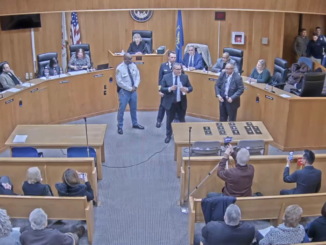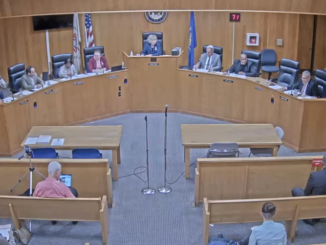
NEW JERSEY—Following several years of wrangling over ways to improve the state’s open public records law—which enables citizens to access government records within seven days of request—an organization representing municipal clerks has urged towns to help pass resolutions calling on the Legislature to form a commission to undertake “a comprehensive reform” of the open public records law.
In New Jersey, two laws dictate what public records can be requested by citizens and what advance notice is needed for public meetings. These are the Open Public Records Act (or OPRA) and the Open Public Meetings Act, both passed in 2002.
Open public records advocates, including many state press associations, have supported state Sen. Loretta Weinberg’s efforts to pass two bills that provide updates to the laws, and even expand access to public records.
However, the two companion bills supported by Weinberg in the 2018–2019 legislative session have not moved much since introduction.
The Assembly version, (A4241) sponsored by state Assemblyman Gordon Johnson, was referred to the Assembly State and Local Government Committee in June 2018 and has not yet been voted on.
Meanwhile, the Senate version (S107) sponsored by Weinberg was unanimously voted on and approved by the Budget and Appropriations Committee in June 2019 but had not been posted for a full Senate vote as of Dec. 5.
Several blog posts by the state League of Municipalities warned mayors and public officials to be wary of possible action on the reform bills—even during the lame-duck session between early November and mid-January—but it was unclear what motivated those concerns.
However, the clerks’ association contends the existing open public records law consumes large portions of time for municipal clerks, and for many clerks, consumes more time every year and also costs the taxpayer in time devoted to fulfilling public records requests.
Officials from the clerks’ association said about 200 of 565 towns have passed a resolution that they are promoting which calls for “comprehensive reform” of the existing public access law.
‘An unnecessary solution’
“The resolutions are an unnecessary solution in search of a problem,” said Walter Luers, president, New Jersey Foundation for Open Government. “They [clerks] do not have a lot of OPRA cases that go to court or end up in court, or waste lots of their time… It’s work, yes, but the public owns these records. There’s not a lot of abuse of the law.”
He said in 18 years since approval of the Open Public Records Act, only a few cases where an individual has abused the law come to mind.
Moreover, he said clerks have a “tremendous number of daily obligations and there’s really no reason to single OPRA out as a problem.”
He said most clerks do “a great job and most OPRA requests are routine.”
He said should a clerk feel a public records request will be “especially time-consuming or interrupt daily operations” the clerk can attempt “to reach a reasonable solution with the requestor, and also apply a special service charge” if it requires extensive research or additional work.
‘Out of control’
Under the resolution adopted by nearly 35% of New Jersey’s towns, it calls OPRA “a well-intended law that has spiraled out of control, due to the volume and nature of requests, the cost to taxpayers in responding to the requests, and the potential liability in having to pay disproportionate prevailing party attorney’s fees should the request turn into litigated matters, as well as the liability in determining which documents shall be released, with or without redaction, while attempting to maintain individual privacy.”
He said the resolution offers a one-size-fits-all assessment of OPRA and offers no data or statistics or studies to back up any charges or claims.
“They make these statements in their resolution but the data doesn’t exist for them to back up these claims,” he said.
Luers said for at least five years or longer, legislation introduced to update the current public records and open public meetings acts has failed to garner enough support for passage in the Assembly or Senate.
He said he would be surprised if the legislation was put up for a vote in either chamber during lame duck.
Instead, he suggested that minor tweaks to the current laws be considered, what he called “skinny reforms” for the Open Public Records Act and Open Public Meetings Act.
Both acts were approved in early 2002 and could be improved with tweaks such as including electronic records (emails and texts) as public records, what constitutes a “quorum” of a governing body; and new methods to use to notify the public in advance of official meetings.
In a series of four blog posts, Lori Buckelew, state League of Municipalities, analyzes four key aspects of the proposed bills, including what constitutes an agenda and required advance notice on agendas and meetings, prevailing attorney fees, subcommittees, and definition of government records.
Mostly, the organization representing municipalities statewide is concerned with limiting local costs, and not creating economic incentives for attorneys to file suit under any revised laws.
“Although the League of Municipalities is a strong proponent of openness and transparency in government, we must continue to oppose both S-106 and S-107 as neither bill addresses the expenses municipalities currently incur and will incur under the new provisions,” notes each blog post.
“Currently complying with the Open Public Records Act (OPRA), municipalities hire additional staff, incur increasing legal expenses to ensure compliance, and expend funds defending litigation based on existing Government Record Council (GRC) and conflicting case law. While well-meaning, OPRA has become fraught with abuse causing municipalities to expend limited administrative and financial resources at the expense and detriment of their taxpayers. In addition, some of the new provisions, especially under the Open Public Meetings Act (OPMA), will establish bureaucratic processes for public meetings without consideration for operations or meeting the needs of our residents,” said Buckelew in the post.
While Leurs did not support any further study of current public access laws, a former Municipal Clerks Association of New Jersey leader, Andrew Pavlica, Garfield’s city clerk, said the job of fulfilling OPRA requests for residents does take up much time and effort, and varies from week to week.
He noted that Little Falls recently hired a full-time person to handle public records requests.
“There’s all this work that needs to be done in a clerk’s office and even on occasion we know of times when the (records) custodian made a good faith effort to fulfill a records request and was still sued,” said Pavlica.
“Only one side is being presented to the public: the ‘evil’ municipal clerks are not trying to help the public,” he said of proposed legislation on both laws.
He said most municipal clerks (public records custodians) go out of their way to fulfill OPRA requests and don’t want any proposed legislation to make their tasks more difficult by imposing additional duties or requirements.
Outreach to Sen. Weinberg and Assemblyman Johnson for comment on the proposed bills was not returned by press time.



